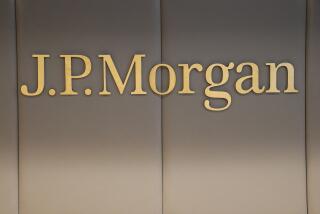JPMorgan execs tied to big trading loss are expected to leave bank
- Share via
The first heads are expected to roll as early as this week at JPMorgan Chase & Co., after the disclosure of a $2-billion trading loss that has rekindled fears about excessive risk taking on Wall Street.
Three employees involved in the unit at fault for the losses are expected to leave the firm, although it is unclear precisely when, according to a source familiar with the matter who was unauthorized to speak publicly.
Ina Drew, who has overseen the bank’s chief investment office, is the highest-ranking JPMorgan employee expected to leave in the wake of the trading blunder revealed Thursday, according to the source.
Drew has offered to resign multiple times and her resignation is likely to be accepted this week, the source said. Drew didn’t respond to a voice mail left at her home in New Jersey.
Also expected to leave JPMorgan are Achilles Macris and Javier Martin-Artajo, who ran the desk in London responsible for the ill-fated derivatives trades, the source said.
The timing of the employees’ departures was uncertain because the firm may need their expertise in unwinding the complex trades at the heart of JPMorgan’s loss, the source said.
It’s unclear whether Bruno Michel Iksil, a JPMorgan trader dubbed the “London Whale” because of his large trading positions, would also exit the firm, the source said.
News of the expected departures comes as JPMorgan shareholders are set to meet Tuesday in Florida. Investors punished JPMorgan on Friday, sending its stock plunging 9%.
On Sunday, JPMorgan’s chief executive, Jamie Dimon, acknowledged that his company’s $2-billion trading loss could empower government regulators seeking to place tighter controls on risky trades by large banks.
“This is a very unfortunate and inopportune time to have had this kind of mistake,” Dimon said in an interview on NBC’s “Meet the Press.”
But the head of America’s largest bank brushed aside the suggestion that the loss underscored the persistent risk posed by mismanagement at large banks more than three years after a financial crisis forced billions of dollars in taxpayer-funded bailouts.
“This is not a risk that is life threatening to JPMorgan. This is a stupid thing that … we should never have done. But we are still going to earn a lot of money this quarter. So it isn’t like the company is jeopardized,” he said.
Dimon, a widely respected executive credited with guiding his company skillfully through the financial crisis while others faltered or failed, has been unusually contrite since disclosing the loss. But he said Sunday he did not know whether the bank broke any laws or accounting rules.
“We know we were sloppy. We know we were stupid. We know there was bad judgment,” he said. As for violations of rules or law, “we don’t know if any of that is true yet.”
Because of his reputation for having managed his bank well, Dimon has had greater credibility than many other Wall Street figures in the debates over financial regulations. “The price” that the bank will pay for its trading loss will be “that they’ll lose their battle to weaken the rules,” Sen. Carl Levin (D-Mich.) said on “Meet the Press.”
Dimon, however, repeated his warning that Democrats have been trying to regulate too much. Dimon, a Democrat, said he has become increasingly troubled by a lot of what Democrats in Washington have been doing.
“I have gotten disturbed at … some of the Democrats’ anti-business behavior, the sentiment, the attacks on work ethic and successful people. I think it’s very counterproductive,” said Dimon, who added that he now describes himself as “barely Democrat.”
Tangel reported from Newark, N.J., and Levey from Washington.
More to Read
Inside the business of entertainment
The Wide Shot brings you news, analysis and insights on everything from streaming wars to production — and what it all means for the future.
You may occasionally receive promotional content from the Los Angeles Times.










